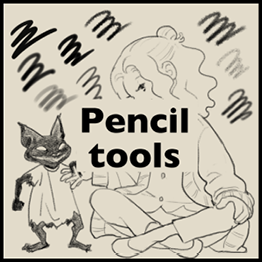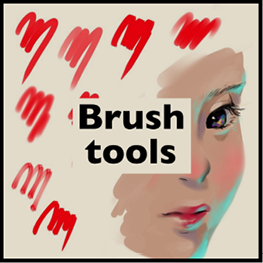Illustration gallery
In the following sections, we will preview each Clip Studio Paint tool you’ll learn how to use in this book. If there’s a style in particular that calls to you, consider jumping straight to that chapter to learn the techniques.

Figure 1.1: A pencil tools sample image
Pencil tools
Figure 1.1 shows examples of pencils that are available in this set of tools. You can use pencils for sketching and expressing warm, crafty art. Yes, you can use pencil tools to complete an entire full-colour manga illustration! Details of how to use pencils can be found in Chapter 3, Penciling: Layer and Layer Property Palettes.

Figure 1.2: An Inking tools sample image
Inking tools
Figure 1.2 shows examples of pens that are available in this set of tools. These are the most popular tools for manga. They produce clean and crisp manga drawings that make it easy to see what’s going on in the scene and are still clear even when printed on colored or bad-quality paper. Details of how to use the pens can be found in Chapter 8, Getting Started with Inking Tools.

Figure 1.3: A brush tools sample image
Brush tools
Figure 1.3 shows examples of brushes that are available in this set of tools. Yes, just like physical brushes, we can mix and blend colors with the brush tools in the latest version of Clip Studio Paint! Oil, water, and calligraphic…there are so many good brushes there. Details of how to use brushes can be found in Chapter 4, Introducing Clip Studio Paint Brushes.

Figure 1.4: A shape tools sample image
Shape tools
Figure 1.4 shows an example of a shape tool drawing. These tools free you from wobbly, shaky lines. Instead, you can create accurate, precise objects, buildings, and décor shapes with shape tools! Learn more in Chapter 11, Exploring Vector Layers.

Figure 1.5: A decoration tools sample image
Decoration tools
Figure 1.5 shows examples of decorations available in this set of tools. They are great for expressing feelings, the tone of scenes, and patterns of clothing! Details of how to use decoration tools can be found in Chapter 4, Introducing Clip Studio Paint Brushes.

Figure 1.6: Textures sample
Textures
Figure 1.6 shows a sample image with and without a texture. If you want to add a paper/scratched/decayed texture to your art, you can always add extra effects by creating or downloading texture images.
You can simply add an extra layer with the texture image and change the layer blending mode. You can learn more in Chapter 16, Using Clip Studio Paint to Color Your Manga.

Figure 1.7: Text and balloon tools sample
Text and balloon tools
Figure 1.7 shows examples of text and balloon tools. Manga creation involves several stages, including panel sketching, inking, coloring (if it’s color manga), adding tones and effects, and adding text. So, you can add dialogue to tell your story. You can learn how to add text and speech balloons in Chapter 7, Using Text and Balloon Tools.

Figure 1.8: 3D figures sample
3D figures
Figure 1.8 shows an example of using 3D figures as a pose reference. You can refer to or trace over 3D models to draw characters. It comes in handy especially when you want to draw accurate posture or objects/bodies from unusual angles. Learn more about using 3D models in Chapter 14, Using 3D Figures and Objects.

Figure 1.9: Layer blending mode sample
Layer blending modes
Figure 1.9 shows an example of a drawing with and without layer blending modes. After completing the basic coloring of your drawing, you might want to add shade, lighting, or light reflection, or even change the overall impression. It is possible to do this using layer blending mode. You can see the entirety of the effects available in Chapter 16, Using Clip Studio Paint to Color Your Manga.

Figure 1.10: Shading Assist sample
Shading Assist
Figure 1.10 shows an example of a drawing with and without Shading Assist. After completing the basic coloring of your drawing, you might want to give it an effective shade. You can choose what type of shading to add, such as Simple shade or Evening shade. The sample image shows Evening shade. You can see the entirety of the effects available in Chapter 16, Using Clip Studio Paint to Color Your Manga.

Figure 1.11: Color mixing sample
Color jitter
Figure 1.11 shows an example of a drawing using color jitter. The latest version of Clip Studio Paint has made very vibrant and realistic color mixing possible. Just turn Change brush tip on for your brush, and you can enjoy how the colors are mixed as you draw. Find out more in Chapter 4, Introducing Clip Studio Paint Brushes.

Figure 1.12: Liquify tools sample
Liquify tools
Figure 1.12 shows an example of a drawing before and after it is retouched with Liquify tools. Notice how the character’s face expands a little, like a fish-eye effect. As you can see, you can change the shape and size of a specific part of an image by tracing it with a pen. It’s so handy when you want to make a minor adjustment to a shape. More details can be found in Chapter 16, Using Clip Studio Paint to Color Your Manga.
























































